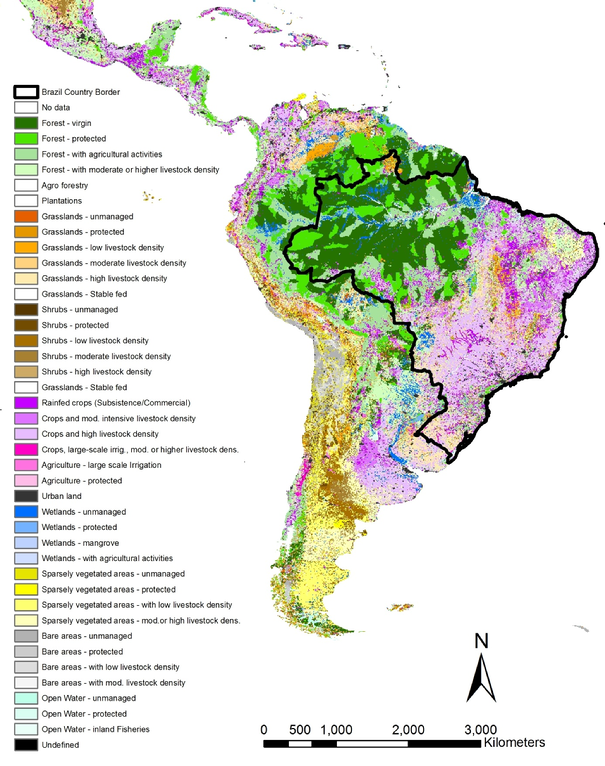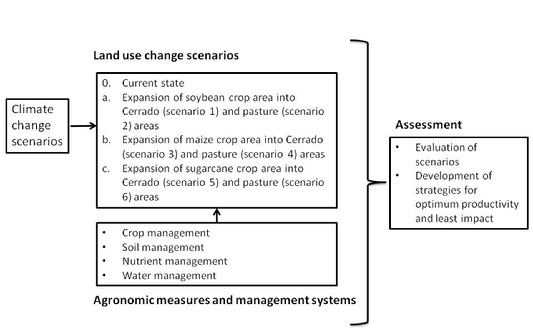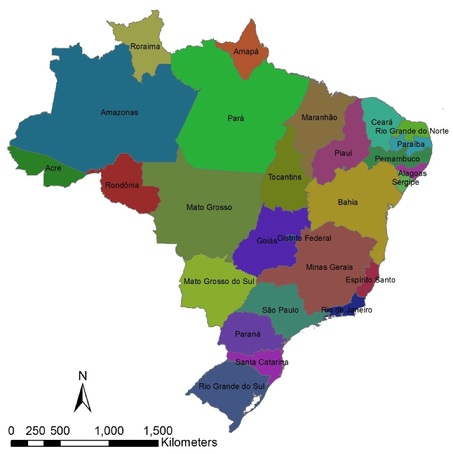Project Description
"Agricultural Resource Efficiency and Reduction of Impacts Under Land-Use and Climate Change Scenarios in Brazil" is a Joint Research Project of the University of Twente, The Netherlands and the University of São Paulo, Brazil. This Dutch-Brazilian joint research project is carried out within the research theme "Biobased Economy", which is a cooperative funding program of NWO (The Netherlands) and CNPq (Brazil).
Persons involved
The Netherlands:
Prof. dr. ir. Arjen Hoekstra, Department of Water Engineering and Management, University of Twente, Enschede
Dr. Maarten Krol, Department of Water Engineering and Management, University of Twente, Enschede
Dr. Markus Pahlow, Department of Water Engineering and Management, University of Twente, Enschede
Brazil:
Prof. Quirijn de Jong van Lier, Division of Tropical Ecosystem Functioning at the Center for Nuclear Energy in Agriculture (CENA), University of São Paulo, , Piracicaba
Prof. Durval Dourado Neto, Crop Science Department, University of São Paulo, São Paulo
Ana Paula Schwantes, Crop Science Department, University of São Paulo, São Paulo
Funding of the project
Nederlandse Organisatie voor Wetenschappelijk Onderzoek (NWO)
Conselho Nacional de Desenvolvimento Científico e Tecnológico (CNPq)
Duration
2014 - 2017
Summary of the Research Project
In English:
The growing world population coupled with changes in lifestyle result in an increasing demand for food, feed and energy crops. This in turn leads to a higher demand for and competition over land and water resources. Brazil is increasingly producing and supplying these crops for other parts of the world, making it a good opportunity to boost economies in the country. To allow for sustainable production to increase, the available resources must be used efficiently. In this research project a detailed analysis of land and water productivity of specific agricultural systems and their shifts due to potential land-use and climate change in Brazil are carried out. Agricultural production and associated environmental impacts are estimated for several land-use and climate scenarios and strategies based on the most resource-efficient approaches for improvement of agricultural production are being developed, with cooperation of a Brazilian company that is active in the agricultural sector. The developed database for land-use and climate change scenarios will increase insights and provide guidance regarding efficient use of resources under a scenario of adaptation of agricultural practice to climate change.
In Portuguese:
O crescimento da população mundial juntamente com mudanças de estilo de vida levam a um aumento na demanda da produção agrícola de alimentos, ração e energia. Por sua vez, essa demanda resulta numa competição intensificada por recursos naturais. Brasil é um dos grandes produtores e distribuidores mundiais desses produtos agrícolas, o que representa uma excelente oportunidade para o estímulo de sua economia. Para permitir o crescimento sustentável da produção, os recursos disponíveis devem ser utilizados eficientemente. Neste projeto de pesquisa, uma análise detalhada da produtividade por unidade de consumo de água e de terra será realizada. A produção agrícola e os impactos ambientais associados serão estimados para alguns cenários de uso de terra e de clima e estratégias baseadas nas aproximações mais eficientes para a melhoria da produção agrícola serão desenvolvidas, com a colaboração de uma empresa brasileira inserida no setor agrícola. A base de dados desenvolvida para os cenários de mudança do uso da terra e do clima aumentará a visão e servirá como guia para o uso eficiente dos recursos num cenário de adaptação da prática agrícola à mudança climática.
Goals of the Research Project
This research project aims at the following objectives:
1)To perform a detailed analysis of land and water productivity of specific agricultural systems and their shifts due to potential land use and climate change in Brazil;
2)To quantify the associated environmental impacts;
3)To develop strategies based on the most resource-efficient approaches for sustainable improvement of agricultural production;
4)To test those strategies in practice with an agricultural company in Brazil.
Methodology
Brazil´s arable area (610 Mha) represents 71% of its total area (851 Mha). The actual land use is divided in pasture (200 Mha) and agriculture (68 Mha). Thereby the pasture area is divided in natural pasture (140 Mha – low technology) and planted pasture (60 Mha – medium and high technology). The major expansion areas for agriculture in Brazil are cerrado and (low technology) pasture. The major agricultural crops in Brazil are soybean (25 Mha), maize (14 Mha) and sugarcane (10 Mha), which together represent about 75% of agricultural area in Brazil. Figure 1 provides a general overview of the land use in Brazil.

Figure 1. Land use in Brazil (source: FAO GeoNetwork)
A number of well-chosen land use change and biomass production scenarios, combined with climate change scenarios, are being investigated. An in-depth assessment of impacts of these scenarios is carried out via indicators that quantify impacts and determine the optimization potential. In Figure 2 the overall project structure is shown.

Figure 2. Overall project structure|
The following land use scenarios will be studied in this proposal, using the current state as reference (Scenario 0: characterization of the selected land use types pasture, soybean, maize and sugarcane in Brazil):
i.Expansion of soybean crop area into cerrado (scenario 1) and pasture (scenario 2) areas,
ii.Expansion of maize crop area into cerrado (scenario 3) and pasture (scenario 4) areas, and
iii.Expansion of sugarcane crop area into cerrado (scenario 5) and pasture (scenario 6) areas (for biofuel, sugar and energy production).
To study the scenarios, pilot areas will be selected in representative regions. The following regions are representative for the selected scenarios (the regions can be seen in Figure 3):
i.Soybean (cerrado and pasture expansion): Micro-region at intersection of Maranhão, Piauí, Tocantins and Bahia States.
ii.Maize (cerrado and pasture expansion): Mato Grosso State.
iii.Sugarcane (cerrado and pasture expansion): Goiás State.

Figure 3. States of Brazil. In-depth analyses will be carried out for Maranhão, Piauí, Tocantins and Bahia, Mato Grosso and Goiás.
Results of the Research Project
Outcomes of the research project will include a detailed description of the current and potential future management systems, the investigated agricultural systems, measures and their effects with respect to yield and resource efficiency. This information can be applied by practitioners, decision makers and stakeholders. Information on the expected impact of future climate scenarios on yield and resource efficiency will also be made available. This information is of value to society as it allows the anticipation of measures needed to guarantee sustainable development in agriculture in Brazil. All results will be stored in a database and linked to a visualization platform for easy access.
